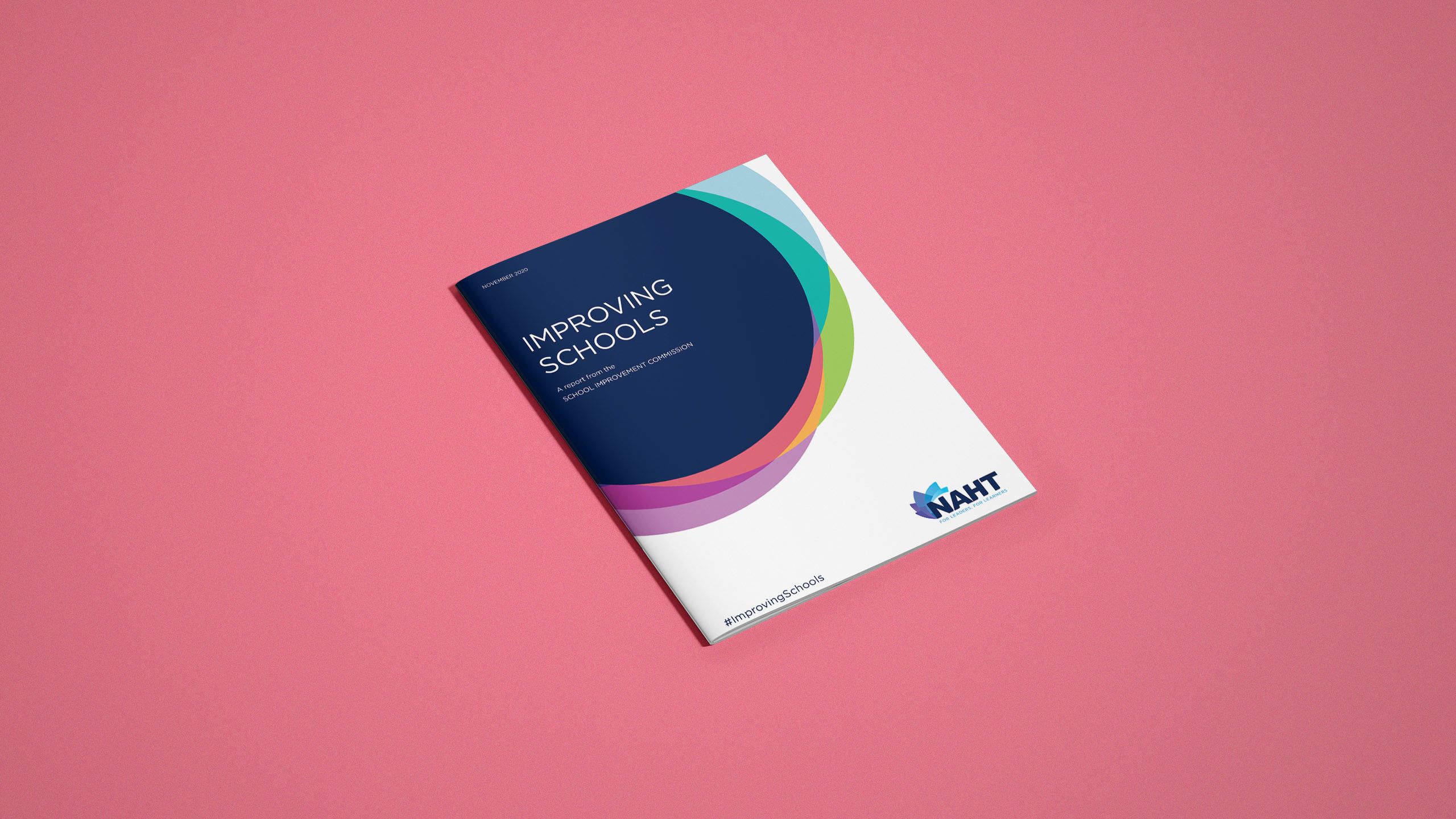Improving schools

Leadership Focus journalist Nic Paton takes a look at the School Improvement Commission’s report.

Back in June last year, the renowned educator and former schools commissioner for London Sir Tim Brighouse delivered the Priestley Lecture at the University of Birmingham. There, in a wide-ranging presentation on the future of the English schooling system, he made the following comments about school improvement:
“If the teacher makes the weather, the school creates the climate. School improvement is how schools create an ever-better climate for the individual and groups of teachers to do their job in the most favourable circumstances.”

NICK BROOK,
NAHT DEPUTY GENERAL SECRETARY AND COMMISSION CHAIR
Sir Tim’s words, to an extent, encapsulate the thinking that runs through NAHT’s latest report by its School Improvement Commission, Improving schools. Indeed, they are cited within the report both as an epigraph and within the afterword by NAHT deputy general secretary and commission chair, Nick Brook.
Improving schools, which is being released on 18 November 2020, is the second report by the commission, and it builds on its Improving school accountability report, which was published in October 2018 (see our Being accountable article in issue 82 of Leadership Focus).
Clearly, a lot of water has passed under the bridge since then – not least, schools having to wrestle with an unprecedented six-month shutdown of the education system and, now, returning to the classroom amid a global pandemic.
But behind the current (and we still have to hope short-term) reality of bubbles, masks, sanitiser and one-way systems, the need to reset and rearticulate some of the more toxic narratives around school improvement and high-stakes accountability has not gone away.
As Nick tells Leadership Focus: “In the first report, we set out the need to rebalance holding schools to account with helping them to improve. We articulated what we felt needed to be the long-term vision for what the future of school accountability and inspection should look like.
“Within this second report, we set out to get underneath what needs to happen to help schools improve.
“We’ve said it should be the profession that steps forward and helps good schools to become great schools. So, what does that actually look like?”To that end, the report has set out 13 recommendations for schools and the government (scroll down for more details on these). Just as importantly, it has articulated a series of 10 core messages around what it believes school improvement should, and needs, to be.




Back in June last year, the renowned educator and former schools commissioner for London Sir Tim Brighouse delivered the Priestley Lecture at the University of Birmingham. There, in a wide-ranging presentation on the future of the English schooling system, he made the following comments about school improvement:
“If the teacher makes the weather, the school creates the climate. School improvement is how schools create an ever-better climate for the individual and groups of teachers to do their job in the most favourable circumstances.”

NICK BROOK,
NAHT DEPUTY GENERAL SECRETARY AND COMMISSION CHAIR
Sir Tim’s words, to an extent, encapsulate the thinking that runs through NAHT’s latest report by its School Improvement Commission, Improving schools. Indeed, they are cited within the report both as an epigraph and within the afterword by NAHT deputy general secretary and commission chair, Nick Brook.
Improving schools, which is being released on 18 November 2020, is the second report by the commission, and it builds on its Improving school accountability report, which was published in October 2018 (see our Being accountable article in issue 82 of Leadership Focus).
Clearly, a lot of water has passed under the bridge since then – not least, schools having to wrestle with an unprecedented six-month shutdown of the education system and, now, returning to the classroom amid a global pandemic.
But behind the current (and we still have to hope short-term) reality of bubbles, masks, sanitiser and one-way systems, the need to reset and rearticulate some of the more toxic narratives around school improvement and high-stakes accountability has not gone away.
As Nick tells Leadership Focus: “In the first report, we set out the need to rebalance holding schools to account with helping them to improve. We articulated what we felt needed to be the long-term vision for what the future of school accountability and inspection should look like.
“Within this second report, we set out to get underneath what needs to happen to help schools improve.
“We’ve said it should be the profession that steps forward and helps good schools to become great schools. So, what does that actually look like?”To that end, the report has set out 13 recommendations for schools and the government (scroll down for more details on these). Just as importantly, it has articulated a series of 10 core messages around what it believes school improvement should, and needs, to be.
So, given the challenging backdrop the report is being published against, what is the hope from here? How will this report be used, and what does NAHT hope to achieve through it?
“This report was largely written before covid-19 hit,” concedes Nick. But he is adamant that, if anything, what we are seeing unfolding this year in terms of increased workload and expectation on all teachers (but especially school leaders) makes it more, not less, relevant and urgent.
“It is too early yet to be talking about any good that may be able to come of this pandemic crisis.
“But one of the things I have noted is that when the chips were down, the government turned to local authorities to coordinate the local offer – that’s after 10 years of undermining local authorities and stripping them of their powers,” Nick points out.“This goes to show that place is important. What we need to get to, therefore, is a system where if you are part of a multi-academy trust, you have a loyalty and responsibility to the other schools in your trust. Clearly, that is who you may well turn to for support in the first instance, or your local authority if you’re a maintained school. But we cannot have a system that pits schools in competition with one another locally.
“Equally, I actually see this report as a potential opportunity for the government. This report hasn’t been written to be toxic to the government. We want the government to adopt it, and we argue parts of it could be helpful within the upcoming comprehensive spending review,” Nick emphasises.
“I think there is a massive opportunity for us here to work with this government, which is, after all, keen to maintain and support its new ‘red wall’ constituencies, on fundamentally addressing the issues that have stopped young people achieving what they can in some of the most desperately poor parts of this country.
“I want to use this report to start a conversation with the government that acknowledges the fact that if we want to unlock the potential of communities and ‘level up’, schools are part of the answer, not part of the problem – but also acknowledging that the government has an important role to play in making the conditions as bright as possible to enable the young people to succeed,” Nick explains.
And what, finally, should NAHT members on the ground be taking away or hoping for from this?
“What we’re trying to do with this report is to recognise that while we do need the government to act, the power to change the climate – the climate that sets the day-to-day weather, as Sir Tim said – resides in school leaders,” says Nick.
“If we want leaders to be able to create the sort of environments in which teachers can thrive, we need to support, develop and trust them too. Just as teachers need the right conditions in which to thrive, so too do school leaders.
“In responding to the current crisis, the country has seen the value of our public services and the value of our teachers and leaders. It’s high time that the government puts them front and centre and invests in them,” Nick adds.
The Improving schools report will be available for you to read on our website (www.naht.org.uk) from 18 November 2020.
Membership of the commission
CHAIR:
Nick Brook (NAHT deputy general secretary)
THE COMMISSION MEMBERS:
Dame Alison Peacock (Chartered College of Teaching)
Carole Willis (NFER)
Chris Kirkham-Knowles (Scalby Learning Trust)
Emma Knights (National Governance Association)
Gary Wilkie (Learning in Harmony Trust)
James Bowen (NAHT)
Judy Shaw (NAHT past president)
Julie McCulloch (ASCL)
Kate Chhatwal (Challenge Partners)
Matt Davis (Education Development Trust)
Natalie Perera (Education Policy Institute)
Richard Gill (Teaching Schools Council)
Rob Williams (NAHT)
Stephen Fraser (Education Endowment Foundation)
Stephen Tierney (Headteachers’ Roundtable)
Steve Munby (Munby Education)
Professor Toby Greany (University of Nottingham)
Tom Rees (Ambition Institute)
Melanie Renowden (Ambition Institute)
Tom Richmond (EDSK)

Membership of the commission
CHAIR:
Nick Brook (NAHT deputy general secretary)
THE COMMISSION MEMBERS:
Dame Alison Peacock (Chartered College of Teaching)
Carole Willis (NFER)
Chris Kirkham-Knowles (Scalby Learning Trust)
Emma Knights (National Governance Association)
Gary Wilkie (Learning in Harmony Trust)
James Bowen (NAHT)
Judy Shaw (NAHT past president)
Julie McCulloch (ASCL)
Kate Chhatwal (Challenge Partners)
Matt Davis (Education Development Trust)
Natalie Perera (Education Policy Institute)
Richard Gill (Teaching Schools Council)
Rob Williams (NAHT)
Stephen Fraser (Education Endowment Foundation)
Stephen Tierney (Headteachers’ Roundtable)
Steve Munby (Munby Education)
Professor Toby Greany (University of Nottingham)
Tom Rees (Ambition Institute)
Melanie Renowden (Ambition Institute)
Tom Richmond (EDSK)

